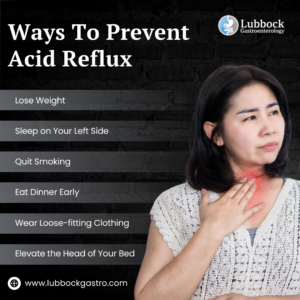Acid Reflux vs. GERD

Acid Reflux vs. GERD
The terms acid reflux and gastroesophageal reflux disease (GERD) are often used interchangeably, but they differ slightly. Acid reflux is the backflow of stomach contents into the esophagus, resulting in a sensation known as heartburn. Acid reflux can sometimes progress to GERD, a more severe form of reflux. Similar to acid reflux, the most common symptom of GERD is heartburn. However, the heartburn that comes with GERD is more frequent, about two or more times a week.
Other symptoms can include regurgitation of food or fluid, difficulty swallowing, coughing, wheezing, and chest pain, especially while lying down at night.
Heartburn and Acid Reflux
Heartburn is a burning sensation in the chest usually caused by acid reflux, which occurs when stomach acid travels up towards the throat. In severe cases, heartburn becomes serious, resulting in gastroesophageal reflux disease.
Heartburn is a symptom of acid reflux. In addition to heartburn, a person suffering from acid reflux can also experience an unpleasant sour taste in the mouth, persistent cough or hiccups, bad breath, hoarse voice, and bloating.
There’s usually no concrete reason why individuals experience acid reflux, but there are certain things that can worsen acid reflux and heartburn.
Heartburn and acid reflux can be aggravated by eating certain foods that are spicy, fatty and sugary, smoking, lying down, bending, and many others.
How to Get Rid of Acid Reflux
If you’re experiencing frequent acid reflux, experts recommend certain lifestyle and dietary modifications to see if they can minimize the travelling back of acid from the stomach to the throat. If there are no changes, you can schedule a consultation with a specialist and get appropriate treatment.
Most times the treatment includes the prescription of medications especially if it’s advanced to GERD. The medications help reduce stomach acid and also help your esophagus to heal from any damage caused by acid reflux.
You should know that the symptoms can come back if you stop the treatment and lifestyle modifications that relieve the symptoms in the first instance. Surgery is the last treatment option for GERD if lifestyle modifications and medications don’t work in alleviating your symptoms.
Ways To Prevent Acid Reflux

Ways To Prevent Acid Reflux
Lose Weight
Excess weight increases your risk of experiencing acid reflux because of the extra pressure it adds to the stomach. Taking active steps to lose the excess weight can help you prevent acid reflux.
A healthy diet and exercise can help you achieve a stable healthy weight and lose any excess weight.
Sleep on Your Left Side
Research shows that sleeping on your left side can help decrease acid reflux at night by up to 71%. Professionals think the reason for this is explained by the anatomy of the esophagus.
The esophagus enters the right side of the stomach, so sleeping on the left side keeps acid away from the lower esophageal sphincter that’s responsible for the reflux.
Quit Smoking
This is especially true for those who smoke. Quitting smoking can help get rid of reflux. Reducing the rate at which you smoke can as well help reduce the severity of the reflux.
Eat Dinner Early
The International Foundation for Gastrointestinal Disorders (IFGD) recommends you eat dinner a few hours before going to bed if you experience acid reflux rather than eating late and then jumping straight to bed immediately after dinner.
Wear Loose-fitting Clothing
Tight-fitting belts and clothing apply pressure on your stomach and aggravate acid reflux. Hence, you should wear loose-fitting clothes frequently.
Elevate the Head of Your Bed
Your sleeping position also matters when it comes to preventing acid reflux. Elevating the head of your bed minimizes acid reflux. It helps improve symptoms like heartburn and regurgitation.
Eat Smaller Meal Portions Frequently
The lower esophageal sphincter is weakened or dysfunctional in people with persistent acid reflux, causing acid to flow up into the esophagus. Symptoms of acid reflux are seen after eating. Therefore, eating smaller portions frequently may help reduce symptoms of acid reflux.
Cook Your Onions
Raw onions are one of the common triggers of acid reflux because raw onions are more difficult to digest and can irritate the esophageal lining, thereby worsening heartburn. If you like to eat onions, always eat them cooked.
Minimize Rigorous Physical Activity After Eating
Avoid intense exercise a few hours after eating. You can engage in mild physical activity and nothing too strenuous that may involve bending over after eating. This is because bending over immediately after eating can send acid into your esophagus.
Avoid Drinking Carbonated Beverages
Carbonated beverages make you burp, and this causes acid to travel into the esophagus. You should avoid drinking carbonated beverages or reduce your intake.
9 At-home Treatments for Acid Reflux
Below are treatments for acid reflux that you can do yourself in the comfort of your home:
Chew sugar-free gums after meals
Chewing sugar-free gum can increase swallowing frequency and minimize reflux. Chewing also promotes saliva production, and this helps weaken stomach acid.
Add ginger to your diet
Incorporating ginger into your daily diet helps minimize the symptoms of acid reflux and GERD.
Opt for high-fiber foods
Fiber is an essential food to incorporate into your diet plan if you experience acid reflux frequently. It fills up your stomach, aids digestion, and eases the symptoms of acid reflux.
Take honey
Studies have shown that honey promotes healing and helps treat reflux and any esophageal damage associated with GERD.
Consume lots of ripe bananas
Ripe bananas are one of the most common alkaline foods. Ripe potassium-rich bananas help counteract irritating stomach acid and minimize reflux
Add papaya to your diet
Papaya can be used to cause minor improvements to heartburn.
Turmeric
Another at-home remedy for acid reflux is turmeric. Combination products containing turmeric have shown promise against heartburn.
Consider herbal tea
Rather than consuming coffee and alcohol, consider herbal tea to reduce the symptoms of acid reflux.
Change your diet
It’s not enough to change when and how much you eat; it’s also important to change what you eat to help relieve heartburn. Consider food rich in fiber, and avoid overly sugary and spicy foods.
7-day GERD diet plan
Day 1
- Breakfast: Scrambled egg whites and whole grain toast
- Lunch: Quinoa salad with roasted root vegetables
- Dinner: Grilled salmon with basil, brown rice and broccoli.
Day 2
- Breakfast: low-fat plain Greek yogurt, blackberries and sliced almonds
- Lunch: Chicken & Kale Soup, medium banana
- Dinner: Turkey Burgers with Spinach, Feta &Tzatziki and Crispy Oven-Baked Fries
Day 3
- Breakfast: Oatmeal with banana
- Lunch: Chicken, avocado, and spinach in a whole grain wrap.
- Dinner: Sweet potatoes, black beans, and sweetcorn.
Day 4
- Breakfast: Low-fat yogurt with banana and cinnamon.
- Lunch: Whole wheat couscous with roasted root vegetables
- Dinner: Brown rice with oven roasted no skin chicken breast and broccoli
Day 5
- Breakfast: Spinach omelette and cantaloupe
- Lunch: Rainbow veggie wraps and a plum.
- Dinner: Simple grilled salmon & vegetables, cooked quinoa
Day 6
- Breakfast: Old-fashioned oatmeal, chopped walnuts and raspberries.
- Lunch: White bean & avocado toast, low-fat plain Greek yogurt and blueberries
- Dinner: One-pan chicken & asparagus bake
Day 7
- Breakfast: Low-fat yogurt with melon and apple
- Lunch: Turkey in a whole grain wrap and spinach
- Dinner: Brown quinoa with poached salmon and courgette
Management of Gastroesophageal Reflux Disease in Adults
The first management option for gastroesophageal reflux disease in adults is lifestyle changes. Your healthcare providers will provide you with the necessary information about your diet and activities that you can adopt to manage the condition. If lifestyle modifications aren’t enough to offer you the relief you need then medications are next in line.
There are both prescription and non-prescription medications to use to relieve GERD. Non-prescription medications for GERD include antacids that neutralize stomach acid. Medications to reduce acid production include histamine (H-2) blockers such as cimetidine and famotidine.
Proton pump inhibitors, medications that block acid production and heal the esophagus can also be used. Prescription medications for GERD include prescription-strength proton pump inhibitors such as omeprazole and prescription-strength H-2 blockers such as famotidine and nizatidine can be used.
GERD that’s not relieved by medications may require surgery.
FAQ
How to Sleep Better with GERD & Acid Reflux
GERD can disrupt sleep with nighttime acid reflux symptoms. To sleep better with GERD and reflux, sleep on your left side and elevate the head of your bed while lying down. Improving sleep hygiene also goes a long way in improving sleep in GERD patients.
What If I Don’t Treat My Acid Reflux?
Leaving your acid reflux untreated can cause chronic damage or scarring in the esophagus.
How long is GERD cured?
Minor cases of GERD can be cured in less than a month while it takes 6 to 12 weeks for moderate cases to be cured. Severe cases of GERD can take a longer time.
What does Stage 4 GERD feel like?
Severe heartburn associated with sore throat, cough and hoarse voice are symptoms of stage 4 GERD.
Why is GERD so bad at night?
Sleep position is the reason why GERD is bad at night. When lying down to sleep at night, gravity no longer helps keep stomach acid down, increasing the likelihood of frequent acid reflux.
Can You Prevent GERD?
Yes, you can prevent GERD by following all the preventive tips discussed earlier.
How Dr Sameer Islam Can Help with GERD in Lubbock, TX
If you are suffering from GERD, a specialist like Dr. Sameer can help improve your condition. GERD is a potentially serious condition, most likely not going away on its own.
Reach out to Dr. Sameer to get it treated and avoid serious complications like ulcers and strictures. Dr. Sameer reviews your condition, requests the necessary tests, and then creates the appropriate treatment plan for you.
Contact Dr. Sameer today or book an appointment for professional GERD treatment in Lubbock, TX.
